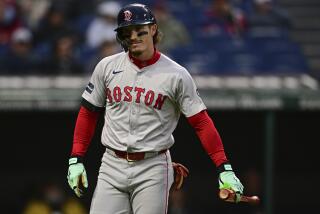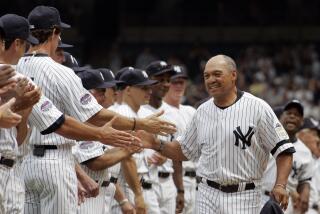After the latest racist incidents at Fenway Park, Boston confronts an ugly reputation

The Boston Red Sox reacted swiftly to another racially charged incident at their ballpark one night after Baltimore outfielder Adam Jones said he was subject to racist taunts at Fenway Park.
It happened again, in Boston, where it has happened so many times over the years: another racist incident at Fenway Park.
The beloved hometown Red Sox and the visiting Baltimore Orioles were preparing to take the field Tuesday night. As a Kenyan woman sang the national anthem, the Boston Globe later reported, a middle-aged white man in a Red Sox hat and T-shirt leaned over to the man next to him and criticized the rendition with a racial slur.
The other fan, who is also white, was offended and complained to stadium security. The man was ejected and, according to Red Sox President Sam Kennedy, banned for life from the storied ballpark.
The episode became big news, but it was an old story.
That story goes like this: Boston is one of the nation’s most politically progressive cities. Boston has some of the nation’s top universities. Boston has undergone a dramatic demographic shift, going from 82% white in 1970 to less than 54% white today.
Yet Boston has never been able to wipe away a reputation for racism that has long stained its name and its communities.
Boston Magazine ran a feature in 2008 about how athletes saw Boston as so racist that they didn’t want to play there, posing this question: “If it’s not a fair label anymore, as so many of us insist, then why won’t it go away?”
Boston is the city where in the 1970s white residents violently resisted efforts to desegregate local schools by busing in black students.
I’m disappointed and discouraged that people like this still exist in the world, never mind my own city.
— Jared Carrabis, Red Sox supporter and writer at Barstool Sports
It’s the city where in 2004 San Francisco Giants star Barry Bonds said he could never play for the home team. “Boston is too racist for me,’’ Bonds told a reporter, who then suggested maybe the team would build a memorial to him and his greatness. “I’m black,” Bonds said. “They don’t build stuff for blacks.”
It’s the city about whose fans Angels center fielder Gary Matthews Jr. told the Los Angeles Times in 2007: “They’re loud, they’re drunk, they’re obnoxious; it’s one of the few places where you hear racial comments. . . . It’s just different.”
The national anthem incident is the second blowup over race at the ballpark this week. Orioles All-Star center fielder Adam Jones, who is black, told reporters that Boston fans taunted him with racial slurs and threw a bag of peanuts at him in the dugout. He called it “one of the worst” nights of abuse he’d received in his career.
“It is what it is, right?” Jones told USA Today. “I just go out and play baseball. But it’s unfortunate that people need to resort to those type of epithets to degrade another human being. I’m out there trying to make a living for myself and for my family.”
His remarks prompted Red Sox representatives to quickly apologize to Jones and ask fans to report similar conduct in the future.
“No player should have an object thrown at him on the playing field, nor be subjected to any kind of racism at Fenway Park,” Kennedy said in a statement. “The Red Sox have zero tolerance for such inexcusable behavior, and our entire organization and our fans are sickened by the conduct of an ignorant few.”
Jones’ complaints also started a familiar cycle of self-scrutiny among Boston residents and sports fans.
“I’m disappointed and discouraged that people like this still exist in the world, never mind my own city,” Jared Carrabis, a Red Sox supporter and writer at Barstool Sports, blogged about how Jones was treated. “No, a handful of fans do not represent the entire fan base, or the city for that matter, but this series of incidents on Monday night sure doesn’t help defuse the narrative that Boston is a racist city. And that is really, really aggravating.”
Last winter, “Saturday Night Live” star Michael Che, who is black, rankled some Bostonians when he riffed about supporting the Atlanta Falcons over the New England Patriots in the Super Bowl.
“I just want to relax, turn my brain off, and watch the blackest city in America beat the most racist city I’ve ever been to,” Che said.
A joke, maybe, but one that he meant, and one that clearly wounded the city’s white liberals.
“Talk to your closest black friend and ask them to explain it to you,” Che said later during an appearance at Boston University. In response, the city’s mayor, Marty Walsh, who is white, told a local radio station that he wanted to talk to the comedian about his experiences with Boston.
“Clearly it is something that is still inside of him and still bothers him or he wouldn’t have made that statement,” Walsh told Boston Public Radio.
Boston’s reputation as an enlightened city of universities and liberalism has long coexisted with its legacy as a stronghold for whites of Irish descent who dominated neighborhoods like South Boston, known as “Southie.” Boston remains a leading locale for movies with white working-class protagonists.
“Boston’s racial troubles are especially strange when they are set against the city’s reputation as a center of learning, leadership in the abolitionist movement and liberal voting record in recent years on other issues, from Vietnam to the nuclear freeze,” the New York Times noted in 1983, adding: “It is possible to go to a baseball game at Fenway Park and not see a black fan.”
The Red Sox were the last major league team to racially integrate, in 1959, when the team added Elijah “Pumpsie” Green to their roster — after the local chapter of the National Assn. for the Advancement of Colored People protested his original assignment to the minor leagues.
The hometown Celtics, on the other hand, were the first NBA team to draft a black player (1950), put an all-black team on the court (1964) and hire a black coach (1966). But that legacy was overshadowed in the 1980s as the team dominated the league with a roster of mostly white stars.
In a 1990 photo essay by Spike Lee in Spin magazine, beneath a picture of a black man in a Celtics jersey, Lee wrote: “Boston sucks. This guy is an ‘Uncle Tom.’ ”
In his 2002 book, “Shut Out: A Story of Race and Baseball in Boston,” Howard Bryant concluded: “The notion of Boston as the moral voice of a nation, as a social beacon and the home of abolition in the eighteenth and nineteeth centuries, was a myth, really.”
When faced with a new round of self-examination this week, the Boston NAACP president, Tanisha Sullivan, was circumspect.
“I think on some level the expectation is that we as a city are much further along than we really are,” Sullivan said. “We really need to have the courage to address certainly our history, recognize where we are, and be willing to do the ongoing work necessary to make sure that Boston truly is that city on the hill.”
ALSO
Trump order on religion fits a pattern — words bigger than deeds
More to Read
Sign up for Essential California
The most important California stories and recommendations in your inbox every morning.
You may occasionally receive promotional content from the Los Angeles Times.











